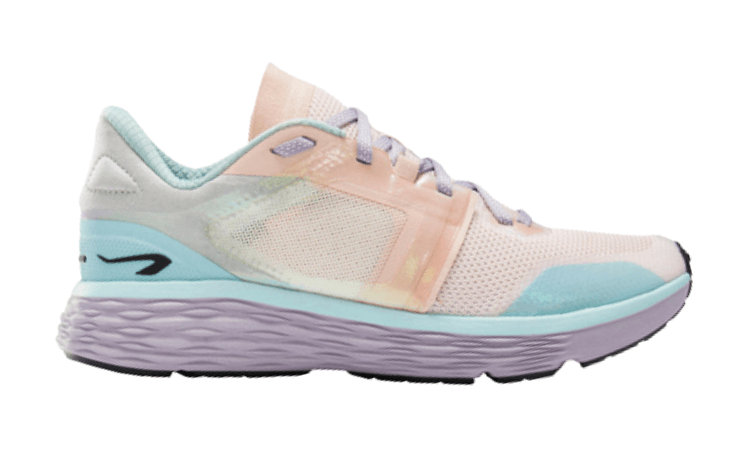Kalenji is likely a vegan brand. Although they don’t make any such claims, they told us that their shoes do not contain any animal-derived materials, ingredients or components when we asked them. Kalenji is the house brand of running & athletic shoes for European sporting goods giant, Decathlon, which is not a vegan company.

Brand Overview
Kalenji is the discount running shoe house brand of French sporting goods giant Decathlon (which itself was founded in Lille, France, in 1976). Decathlon participates in many charitable projects annually, and make efforts to reduce their carbon footprint and water usage. However their supply chain has human rights concerns (acknowledged by their own internal reports), and they use low-end, environmentally harmful materials.
- Parent company founded in 1976
- Brand based in France
- Available worldwide
- Somewhat transparent brand
- Parent brand not vegan
- Charitable parent company
- Human rights concerns
- Made in Asia
- Environmentally-harmful materials
- Mass-produced
- Low-end synthetic materials
- "Accidentally" vegan
About Kalenji
In our view, Kalenji, and their parent brand Decathlon, highlight the true cost and negative effects of low-cost, mass-produced items. Although this brand is technically vegan, it also takes a massive toll on the environment and a portion of the workers in its manufacturing supply chain, as well the local retailers and producers within its area of influence.
Is Kalenji an ethically vegan brand?
Kalenji does not appear to be an ethically vegan brand, as their website doesn't even make mention of it, nor do they donate to animal-related charities within their publicized charity efforts. They also told us that "animal derived material are more expensive than synthetical material, so there's no really interest for us to use it," implying that they use vegan materials out of cost-related convenience, rather than for ethical or environmental reasons.What materials are used to make Kalenji shoes?
The following is an example of a breakdown of materials used to make a model of Kalenji shoes: outer sole is 60% Ethylene Vinyl Acetate (EVA), 40% Rubber - a synthetic upper made of 70% Polyester Cationic, 30% Polyurethane Lining and a sock made of 100% Polyester. We've looked at several models of their shoes from across price ranges and found they were all similar, although not always identical, in composition. Each shoe listed on their website will give a breakdown of the materials used to make it. The Kalenji team also told us that "the glue and dyes we use are made of oil and water. Animal derived material are more expensive than synthetical material, so there's no really interest for us to use it."Are Kalenji shoes eco-friendly/sustainable?
With regard to eoc-friendly materials, Kalenji shoes are not likely sustainable - given their use of low-end synthetic materials, their mass-production model, low price point and global reach, Kalenji shoes are actually likely to be among the least environmentally-friendly shoes in the vegan running shoe world from a materials standpoint. In terms of their sustainability from an emissions, energy, water and chemical standpoint, Kalenji's parent company, sporting goods giant Decathlon lays out their elaborate sustainability plans on their website, mainly relating to reduction in water usage and emissions, as well as increasing the lifespan of their products. In September 2021, the Science Based Targets initiative officially validated Decathlon's commitments related to various emissions and energy usage initiatives set forth in the plan. It's worth noting that to its credit, Decathlon seems to acknowledge their shortcomings in various areas of sustainability. Whether or not they reach their goals remains to be seen.Does Kalenji use green shipping methods?
Kalenji's parent company, Decathlon claims to be taking measures to reducing the environmental impact of their transport by way of being less reliant on air transport. They have a stated goal of air transport representing less than 1% of their products' transport by 2026 (before 2018, they claim to have used air transport up to 6%, with it being reduced to 4% in 2020). Decathlon also aims to reduce reliance on diesel fuel by using more electric, natural gas and bio-fuel powered transport and les less diesel-based transport. Decathlon claims to have already noticed an improvement for road transport between their Regional Supply Chain Centres and their Continental Supply Chain Centres. They state that at the start of 2020, 25% of their kilometres were “more sustainable” thanks to their negotiations with transport partners. On the trajectory side, they aim to achieve 35% “clean kilometres” in 2021, 50% in 2022 and 75% in 2023.Does Kalenji promote ‘slow fashion’ or a ‘circular economy’?
No. Despite their claims to improving sustainability, it's obvious that Kalenji is likely the exact opposite of a circular economy/slow fashion company. For example, they use manufacturing labour from countries known for their lack of human/worker rights; they mass-produce goods; they produce seasonal goods; they use non-environmentally friendly synthetic materials; they don't incorporate natural or recycled materials; they have global supply & production chains with a global sales & distribution system; they overproduce which results in new shoes being sent to the landfill; and they dominate smaller local producers and retailers. Basically, their business model is in direct conflict with the slow fashion movement as it promotes the mass consumption of discount goods.How should I dispose of my worn out Kalenji shoes?
We’ve asked the Kalenji team if they currently have, or are developing, a shoe recycling program, and are awaiting reply. In the meantime, Get it Vegan recommends either trying to have them repaired, donating them to someone in need, or taking them to a clothing recycling depot (if available in your city), which can strip them down to their recyclable components.Where can I buy Kalenji shoes?
Kalenji shoes can be purchased from many of the 1,600 Decathlon sporting goods stores worldwide (many of which are in Europe). You can also buy they them from the Decathlon website of your region (for example, the UK, France, Canada and the United States all have their own Decathlon websites).Do Kalenji shoes ever go on sale?
Kalenji shoes do go on sale from time-to-time at Decathlon's regional stores, although sales amount and frequency can vary greatly. It's worth noting that Kalenji is already considered a "discount" brand, with shoes starting as low as $20 USD.Are Kalenji shoes ethically made?
Kalenji is not without controversy with regard to its manufacturing labour. We've asked the brand where their shoes are made, and they told us, "Asia (different factories, all around Asia,...China, Vietnam…)," areas which are well known for exploitative labour practices. However, according to Kalenji's parent company, Decathlon, "Our Social Charter was created in 2003... is based on ILO Conventions and the Universal Declaration of Human Rights. The Social Charter is a contractual document signed by our suppliers prior to any business relationship and setting out our requirements on safety and human rights in such categories as child labor, working hours and discrimination." They also claim to audit their facilities regularly and grade them on a scale from A to E, with D & E being "unacceptable" with regard to adherence to Decathlon's Social Charter. BUT HERE'S WHERE IT GETS MESSY - According to Decathlon's somewhat transparent reports (only somewhat transparent because the names of their suppliers are not disclosed), in 2019 only 86% of the of their tier 1 production sites were rated A, B or C for their "HUMAN RESPONSIBILITY IN PRODUCTION." This might seem like a high number, but it means that 14% weren't in compliance. To read more, check out Decathlon's publicly shared Duty of Care Plan.Is Kalenji a charitable company?
Kalenji's parent company Decathlon operates The Decathlon Foundation, which they claim currently supports 30 to 40 charitable projects a year, and has supported more than 500 projects in 50 countries since 2005. They also claim that "this amounts to more than 400,000 children, women and men in vulnerable situations that have benefited from Decathlon Foundation projects."Kalenji Product Range
Kalenji makes discount running & athletic footwear for men, women & children. Their pricing can range from $20-$60 USD, and be even lower depending on sales. They currently make a wide variety of functional shoes, including:
- Road running shoes
- Off-road runners
- Cross-country runners
- Orienteering shoes
- Track spikes
- Soccer cleats
